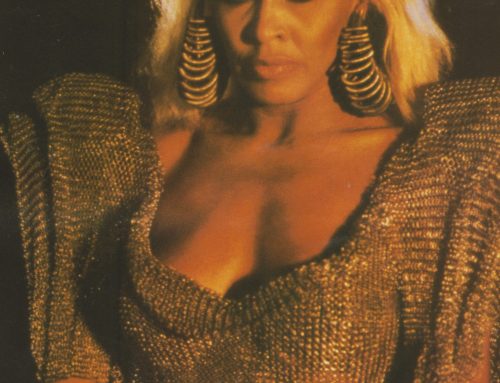2021 Introduction: One of the nominees for induction into The SoulMusic Hall Of Fame in the category, ‘Legacy (Posthumous) Award,’ Bunny Sigler created a musical legacy as a formidable singer, songwriter and producer in particular with his recordings at Philadelphia International and then with Salsoul Records in the late ‘70s. He met up with David Nathan in the summer of 1978 to talk about his disco hit “Let Me Party With You”…
Bunny Sigler aka Bundino Sigalucci: The Reluctant Songwriter
By David Nathan
In person interview, conducted at the Manhattan offices of Salsoul Records, July 1978
With a couple of albums under his belt from his days with Philly International and his hit of ’67 “Let The Good Times Roll” behind him, Bunny Sigler is finally coming to the fore as a hit recording artist. He’s got lots of plans for the future, including a whole lot more songwriting and producing…
“YOU could say that I’ve been pressured for ten years!” is what Bunny Sigler has to say about his absence from the charts since “Let The Good Times Roll/Feel So Good” first hit the r&b and pop listings back in 1967 when the old Cameo-Parkway company was literally flying high. Fortunately, with his recent signing with Gold Mind Records and Salsoul Records, Mr. Sigler (also known as Bundino Sigalucci!) has finally struck home again with his “Let Me Party With You” single and album which have both received acceptance and sales throughout the U.S.
In between that first hit and now, Bunny was with Philadelphia International Records and when we caught up with him, we were curious to know a little of the background that brought Bunny into the company. “Well, initially, when “Good Times Roll” came out, it was at a time when Cameo-Parkway were doing o.k. Then, I was under contract to John Madara and although the company went under, I had problems recording after that for contractual reasons. We had a spell at Decca, which was probably due to the fact that Leon Huff was working with Len Barry there. Anyway, I couldn’t record for about two years and for the first one of those years, I worked off “Good Times”. Then, for the second year, I worked almost daily in Kenny Gamble’s office and the funny thing was that Kenny really saw me as a writer more than an artist — and I learned something from that: that you have to pinpoint someone’s strongest point and work on that.”
It seems that Mr. Sigler was a reluctant songwriter in that “I wrote basically for myself, not for other artists, and I only gave the songs to other people when I was hungry, when the money was low. Initially, I did some things for The Chambers Brothers and Wilson Pickett — I had some things on his Philly album and I cut a song on a group called The Cruisers, “Picture Us” which I later did for myself. But to begin with, I wasn’t signed with Gamble & Huff as a writer: when contracts permitted, they signed me as an artist and it was only after about a year and a half that I actually signed with them as a songwriter too.”
Although Bunny confesses that he wasn’t entirely happy with his situation at Philly International, he says that one of the main reasons he stayed with the company so long was because “I was different, I wrote in a different way unlike a lot of the guys who might come to the company trying to sound just like Kenny & Leon. But what was basically wrong is that although they signed me as an artist, they never really saw me that way. They didn’t want me to get into being a vocalist that much and it was really only for contractual reaons that the first album was ever released — and I’d been waiting four years for that one! Basically, it was just experiments and demos — things that were never really finished the way I wanted them to be. And really, although Kenny & Leon were supposed to produce me, that’s not actually what happened. In fact, I really put those songs that were on those Philly albums together in between writing and producing — because I worked for a period with Joe Simon since I wasn’t under any exclusive production arrangements. I’d have to say that I was unsatisfied with those Philly albums because they never got the concentration that they should have done in any area. And there’s a vast difference between those albums and say, the one we have out now through Salsoul. For instance, nobody really engineered or mixed those other albums the way they should have been done. For this one, we worked with Tom Moulton and it was just like the difference between night and day!”.
With his contract with Philly International up, Bunny spent a fruitless couple of months with Famous Music “which never happened at all — we really ran into some problems there, although I did start working with Al Martino on something!” and after that, found himself working with Barbara Mason on a project for Curtom Records. “Initially, Billy Butler was supposed to do the duets with Barbara on the album but the vocal blend just didn’t happen, Curtis Mayfield heard my rough vocals on the songs — I was supposed to be the producer for the whole project — and so we agreed that I would cut them with Barbara and since I didn’t have any records out at the time, it made sense. I was satisfied to a point with the album although I don’t feel that it received anything like the kind of promotion it should have — it was almost four months after it was released that “Locked In This Position” got any kind of airplay.”
Bunny then decided to take matters into his own hands and went into the studios to cut “Let Me Party With You”. He notes, “I went to practically every single record company in New York and Los Angeles and I just got tired of the runaround I was getting. It seemed that even if someone was really interested, they would have to pass it on to someone else and it just seemed to be taking forever. What shocked me was that a lot of people turned down my product in favour of some other things I heard and, of course, my record has done well whereas some of those other things that people felt were stronger have just fallen by the wayside!”
All of which must prove something and what it did for Bunny has lead him to Salsoul Records. “There were a lot of reasons why I chose Salsoul. Firstly, after I played the single to Ken Cayre, the president, he said straight away that we had a deal. And that was what I wanted to hear — I got tired of hearing about how people had to have a million meetings to make a decision. And then, the company isn’t overcrowded with artists so I don’t have to compete with people for attention actually at the company. Plus, they are giving me more freedom that I’ve ever had in choice of material, as a writer and as a producer.”
“Let Me Party With You” has finally taken Bunny back into the chart spotlight and some initial reactions suggested that it really could have been the follow up to Marvin Gaye’s big hit, “Got To Give It Up”. Bunny laughs: “Well, I was expecting even more comment than we actually got about that, you know! The only thing that I really ‘borrowed’ from Marvin’s record was the drum thing. But, you know, we did the initial thing on just a two-track machine — we were just around and boom, there it was!”
Bunny, of course, built up an enviable reputation as a producer and songwriter during his stay at Philly International and he’s by no means ignoring those aspects of his talent. “Right now, I’m working on the Instant Funk album — they’re my back-up group for the road as well — and that should be ready any time soon, after we finish our current month on the road. Plus I did a couple of the songs on the new Double Exposure album and three songs on the Loleatta Holloway album, including one duet we cut together. I must say that I found Loleatta to have the same kind of energy and fire that Eddie Levert of The O’Jays has.”
Speaking of that particular group, Bunny also contributed three sides, as a producer, to their new album project. “The guys came to me for some songs and originally, the ones I had were earmarked for Instant Funk but I decided to give them to the group. One of them was written with my brother, another with Harvey Scales (who wrote “Disco Lady”) and the third one was one of my own compositions.”
Although Bunny did spend some time on the road — on the West Coast specifically, especially in and around San Francisco, which remains one of his strongest markets — during his tenure at Philly International, he’s never really been out on the kind of national jaunt that he’s presently contemplating. Overall, Mr. Sigler says he’s really happy with the way his career is progressing. “I don’t feel that even this album says all the things I want to say. Right now, there are certain things that I have to do musically to get across to the public but I do have a lot of new and innovative ideas that I’m going to be using in the future.
“I’d say my main concentration in the future is going to be in songwriting as a specific thing — wherein before I’d just write when I was hungry, now I’m going to be doing it as a definite project for particular people. And, of course, producing — I’ll continue to do that. But I must add that the one thing I really want right now is a gold album and a gold single, just to prove that I am capable as an artist and that I can sing!”
{“preview_thumbnail”:”/sites/classicsoul.rock.tools/files/styles/video_embed_wysiwyg_preview/public/video_thumbnails/lToWjCznC9c.jpg?itok=4-k5C_h6″,”video_url”:”https://youtu.be/lToWjCznC9c”,”settings”:{“responsive”:1,”width”:”854″,”height”:”480″,”autoplay”:0},”settings_summary”:[“Embedded Video (Responsive).”]}
{“preview_thumbnail”:”/sites/classicsoul.rock.tools/files/styles/video_embed_wysiwyg_preview/public/video_thumbnails/c5sITiCJeTs.jpg?itok=95CkJui9″,”video_url”:”https://youtu.be/c5sITiCJeTs”,”settings”:{“responsive”:1,”width”:”854″,”height”:”480″,”autoplay”:0},”settings_summary”:[“Embedded Video (Responsive).”]}





